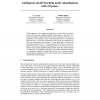Free Online Productivity Tools
i2Speak
i2Symbol
i2OCR
iTex2Img
iWeb2Print
iWeb2Shot
i2Type
iPdf2Split
iPdf2Merge
i2Bopomofo
i2Arabic
i2Style
i2Image
i2PDF
iLatex2Rtf
Sci2ools
116
click to vote
NIPS
2003
2003
Ambiguous Model Learning Made Unambiguous with 1/f Priors
What happens to the optimal interpretation of noisy data when there exists more than one equally plausible interpretation of the data? In a Bayesian model-learning framework the answer depends on the prior expectations of the dynamics of the model parameter that is to be inferred from the data. Local time constraints on the priors are insufficient to pick one interpretation over another. On the other hand, nonlocal time constraints, induced by a 1/f noise spectrum of the priors, is shown to permit learning of a specific model parameter even when there are infinitely many equally plausible interpretations of the data. This transition is inferred by a remarkable mapping of the model estimation problem to a dissipative physical system, allowing the use of powerful statistical mechanical methods to uncover the transition from indeterminate to determinate model learning.
| Added | 31 Oct 2010 |
| Updated | 31 Oct 2010 |
| Type | Conference |
| Year | 2003 |
| Where | NIPS |
| Authors | Gurinder S. Atwal, William Bialek |
Comments (0)

